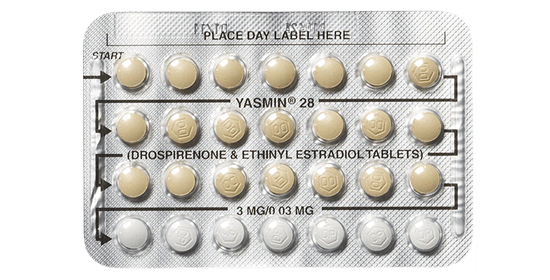WE’RE HERE TO GET THIS METHOD WORKING BETTER FOR YOU.
And if it still doesn’t feel right, we’ve got ideas for other methods. Just remember: If you change methods, make sure you’re protected during your switch.
IT’S HARD TO REMEMBER TO TAKE THE PILL.
Consider setting an alarm on your watch or phone, downloading a reminder app or leave yourself a note. You can also try to get in the habit of grouping your pill taking with another activity, like brushing your teeth.
Still not working?
If you use a reminder system and you’re still having trouble remembering, you might want to consider a method that you don’t have to think about quite so often.
You only have to remember to change the patch once a week and you only have to worry about
the ring on a monthly basis.
There are even options you can forget about for years: take a look at the 2 types of
IUDs and
the implant.
I KEEP BREAKING OUT WITH ACNE.
Most pills actually help with acne, so you could talk to provider to see about switching to another kind of pill.
Still not working?
If you try another type of pill and it doesn’t help, you could also switch to another hormonal method, such as
the ring,
the shot,
the implant, or an
IUD. Or you could switch to a non-hormonal method like
male condoms or
female condoms.
IT MAKES ME NAUSEOUS.
Try this: If you want to stay on your current type of pill, you could try taking it at night. You could also talk to your doctor about getting a pill with less estrogen.
Still not working?
You might want to try another hormonal method that’s not taken by mouth, such as
the implant, an
IUD,
the patch,
the ring, or
the shot.
I’M BLEEDING IN BETWEEN PERIODS.
Try this: If you just started the pill in the last few months, try to power through. This problem will most likely fix itself. Also, make sure you are taking your pills at the same time each day and not skipping pills and then doubling up. These sorts of things can increase chances of spotting.
Still not working?
If you’ve been on the pill for a while and are taking it correctly, you might consider a new method (like
the shot,
the patch, or
the ring), but also get checked for STIs and pregnancy, just to be sure those aren’t the reason for the bleeding.
I’M TRAVELING TO A DIFFERENT TIME ZONE AND DON’T KNOW WHEN I SHOULD TAKE MY PILL.
Basically you need to figure out what time it is in your home time zone and take it at that time. For example, if you live in Washington, DC, and you travel to Spain, which is 6 hours ahead, you should take your pill 6 hours later in the day than you normally would. So if you take your pill at 9AM in DC, you should take it at 3PM in Spain.
If it’s easier (for example, if your usual pill time falls in the middle of the night wherever you’re visiting), you can change your schedule, as long as you don’t go more than 24 hours without a pill. So, if you live in DC and you go to Spain and want to stay on a 9AM schedule, it’s totally fine to take your next pill at 9AM Spanish time (18 hours after your last East Coast pill).
Also, if you’re traveling long enough that you’ll be starting a new pack of pills while you’re gone don’t forget to stick them in your suitcase.
Still not working?
If you travel a lot and like using a hormonal method, you may want to consider switching to
the ring or even
the patch so you won’t have to worry so much about keeping track of time zones. If you want to completely forget about time zone calculations, check out
the implant or an
IUD.
I MISSED A PILL
Take your next pill as soon as you remember, and use a back-up method for 7 days afterward (unless it was a 4th week reminder pill, in which case you can just throw out the reminder pill for that day and get back on schedule).
If you’ve had sex since you got off schedule and that’s within the last five days, you might want to take
emergency contraception just in case.
I MISSED MY PILL YESTERDAY AND WANT TO KNOW IF IT’S SAFE TO TAKE TWO PILLS ON THE SAME DAY.
The short answer is yes. If you missed a pill it’s sometimes recommended to take two pills in one day, and if you want to use regular pills for emergency contraception, you might take 2-4 at once. So taking 2 pills at least 10 hours apart shouldn’t be a problem. If the pills are taken close together, it could make you a little nauseous (and puking right after taking your pill is not good). Your best bet is to consult your healthcare provider and use a backup method such as condoms or abstain from sex in the meantime.
I WANT TO START TAKING MY PILL AT A DIFFERENT TIME.
That’s fine—the easiest thing is probably to finish out your current pack on schedule and start the next pack at the time you prefer. In that case you shouldn’t need any backup.
If you can’t wait for your next pack, just make sure you don’t allow more than 24 hours to pass between pills. So, for example, if you want to switch from morning to afternoon, you have to take 2 pills in one day—one at the old time and one at the new time. That’s probably better than waiting 36 hours and worrying about backup for a week! Only catch is you may also have to re-label your pill pack, because if you take the “Wednesday” pill on Tuesday night and forget to change the rest of the pack, confusion may abound.
